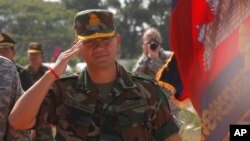Prime Minister Hun Sen’s son gave an interview to Australian television last week, and analysts say it showed his potential entry into politics.
Hun Manet declined to say whether he wanted to one day take over from his father, who has ruled Cambodia for more than 30 years.
Koul Panha, director of the election watchdog Comfrel, said the interview itself showed Hun Manet’s willing to enter the political fray. However, Koul Panha said Hun Manet, who is an officer in the military and one of his father’s bodyguards, would unlike bring fresh policies forward were he to enter politics.
Hun Manet would do better to give interviews to Khmer-language media, rather than in English, he added. “Locally, he has not expressed his opinion or debated politically,” Koul Panha said.
Young Cambodian politicians use the influence of their relatives, which makes competition unfair and non-transparent, he said, leading to disputes between parties and a lack of opportunity for other young leaders.
Ou Virak, head of the think tank Future Forum, said Hun Manet has more opportunities than others, especially, as the eldest son of the prime minister. An open interview on television makes him a politician, Ou Virak said.
In the ruling Cambodian People’s Party, “a succession like this seems possible, as Prime Minister Hun Sen has the power in the party,” he said. “But to succeed as prime minister is an issue of politics between parties. I don’t think it would be totally possible.”
If Hun Manet were to take over, that would mean a military leader, such as in Thailand or Egypt, Ou Virak said.
Still, some were impressed with the interview. Phoak Kung, head of the Cambodian Institute for Strategic Studies, said Hun Manet made good points in general, especially his focus on peace and stability.
Yem Panhearith, a spokesman for the Cambodia National Rescue Party, said his party was not surprised by the interview, but rather it is focused on what the youth need to be ready for economic integration with Asean, as well as other issues, such as unemployment.







